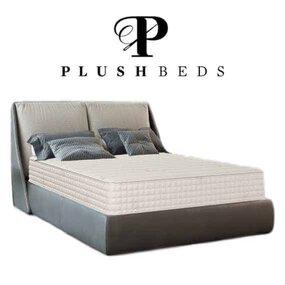Allergies are a burden some of us are destined to carry from the youngest age all through adulthood. You come to the terms of never owning a pet or hating spring because of the constant sneezing. Dust, pollen, mold, and pet dander are well-known allergens. And most of them quickly find their way into your mattress! It’s time to stop sharing your bed with the enemy. Choose the best hypoallergenic mattress that’ll have you feeling like a million bucks in bed.
In this guide, we’ll review the top hypoallergenic mattresses from some of the most well-known brands. We’ll also list the 4 most important things you should know when purchasing a mattress for your allergies. Don’t skip this part!
Best Hypoallergenic Mattresses
- Best Hypoallergenic Mattress: PlushBeds Botanical-Bliss »
- Best Hypoallergenic Foam Mattress: Puffy »
- Antimicrobial Mattress: Saatva Zen Haven »
- Affordable Hypoallergenic Mattress: Awara Organic Mattress »
How to Choose the Best Hypoallergenic Mattress
Make sure you’re getting a comfortable mattress that works best for your allergies. Getting rid of your allergies shouldn’t come at the cost of back pain or a stiff neck! The best hypoallergenic mattress is certified and labeled as such. It should be breathable and comes with a flexible trial period.
Top Hypoallergenic Mattresses Compared
These are the top hypoallergenic mattresses from some of the most well-known brands, available to purchase online. We’ll compare important features and specs to that’ll help you determine if the mattress is right for you.
| Brand | Material | Hypoallergenic Properties? | Trial Period | Price |
|---|---|---|---|---|
PlushBeds Botanical Bliss | GOTS Certified Organic Cotton Cover | – Antimicrobial – Dust-mite proof | 100 nights trial | |
Puffy Mattress | Bamboo rayon cover | Dust-mite proof | 101-night trial | |
Saatva Zenhaven | GOTS certified organic cotton cover | – Comes with Guardian (antimicrobial treatment) – Dust-mite proof | 180 nights trial | |
Awara Organic Mattress | Organic cotton and organic New Zealand wool cover | – Antimicrobial – Dust-mite resistant | 365 nights trial |
Hypoallergenic Mattress Reviews
1. Best Hypoallergenic Mattress – PlushBeds Botanical Bliss
Botanical Bliss, Organic Hypoallergenic Mattress
The Botanical Bliss by PlushBeds is an organic hypoallergenic mattress made with organic cotton, latex, and wool. Get luxurious comfort and firm support, all while tackling allergies. The Botanical Bliss is made in the USA and comes recommended by chiropractors and orthopedic specialists.
Highlights:
- Anti-microbial
- Dust-mite resistant
- Certified organic wool, cotton, and latex
- Customizable firmness levels
- Made in USA
PlushBeds Botanical Bliss is a mix of comfort, allergy relief, and certified organic materials. This mattress hits all the right spots with three latex support layers, 10lb of organic wool, and a cotton cover. If you’re not sure what firmness you’d love, no problem. You can always switch the latex layers to achieve the right firmness.
Best of all, this mattress is non-toxic, anti-microbial, and sleeps cool. It’s dust mite resistant, mold and mildew proof, and has no smells or irritants. Choose to sleep deeper, calmer, and more restfully. It’s not cheap, but it definitely worth it for an allergy-free sleep.
Pros and Cons of the Botanical Bliss Mattress:
Pros
- Checks all the boxes for allergy sufferers. It’s non-toxic, anti-microbial, breathable and dust-mite resistant.
- If you’re not sure what firmness level is right for you, swap individual layers within the mattress until it’s right for you.
- Talalay and Dunlop latex layers ensure you sleep cool through the night.
- Comes recommended by orthopedic specialists and chiropractors.
Cons
- Latex layers are heavy and difficult to rotate. If you’re experiencing mobility issues, this can be problematic.
Keep allergies at bay with PlushBed’s Botanical Bliss mattress. This supreme mattress comes with a 100 nights trial and an outstanding 25-year warranty.
2. Best Hypoallergenic Foam Mattress – Puffy Mattress
Puffy Mattress
Puffy is a hypoallergenic foam mattress designed for all sleeper types! It’s breathable, cooling, and dust mite-proof. As a bonus, the Puffy mattress comes with a removable stain-resistant bamboo rayon cover and enhanced back support!
Highlights:
- Hypoallergenic mattress
- Comes with a removable and washable cover
- Features a lifetime warranty!
- Made in Canada
A hypoallergenic foam mattress is harder to find, so Puffy mattress is our special guest on the list. If you adore the cradling feeling of memory foam this is the mattress for you! It features a cooling gel cloud layer that helps you sleep cool and doesn’t trap heat. Puffy’s Firm Core Support foam adapts to your body, supports your back, and reduces pressure.
The Puffy mattress stars a bamboo rayon cover that stops dust mites, and pet dander in its tracks. The cover is washable and spill-proof. Just wipe it, and it’s good as new.
Pros and Cons of the Puffy Mattress:
Pros
- The washable cover is heaven-sent for allergy sufferers. Frequent washing can destroy and prevent dust mites from breeding in the mattress.
- Bamboo rayon used in the cover is naturally hypoallergenic and dust-mite resistant.
- Puffy offers a lifetime warranty on their mattress which is more than most manufacturers.
- Comes at an affordable price point.
Cons
- Compared to other mattress manufacturers, Puffy has a shorter trial period of 101 nights.
- Off-gassing can occur with memory foam so this may not be the right mattress for those sensitive to smells.
Get your bed for life with the Puffy mattress. This Canadian-made hypoallergenic mattress comes with a lifetime warranty! Feel good knowing Puffy donates from each purchase to kids in need.
3. Antimicrobial Mattress – Saatva Zenhaven
Zenhaven Antimicrobial Mattress
Treated with Guardin and made with naturally hypoallergenic latex, the Saatva Zen Haven is easily the best antimicrobial mattress out there. It’s the perfect mix of natural latex, organic wool, and GOTS-certified cotton. Comes with 5 support zones for long nights of uninterrupted sleep
Highlights:
- 100% natural and hypoallergenic
- Treated with antimicrobial material
- Mattress is zoned in 5 areas
- Made in the USA
Zenhaven is the best antimicrobial mattress made with a natural blend of organic cotton, latex, and New Zealand wool. It’s free of harmful chemicals and dust mite-proof. The cover is treated with Guardin, a botanic antimicrobial treatment.
The Talalay latex is soft, durable, and resilient. This is a flippable mattress, so you can enjoy a plush or a firm side. It features five support zones that cater to your body’s needs. Whether it’s comfort or pressure relief, the latex has you covered. New Zealand wool acts as body heat control and natural flame retardant. Zenhaven comes with a 180-day trial, but it is on the pricier side.
Pros and Cons of the Zenhaven Antimicrobial Mattress:
Pros
- Uses natural materials (latex, organic cotton, and wool) that are dust mite resistant and hypoallergenic.
- Proprietary antimicrobial treatment, Guardin, is used on mattress cover.
- 5 different zones of density is great for those suffering from back pain or those needing extra support.
- Free white glove delivery & setup
Cons
- Price is on the premium end and may be out of range for some.
If you’re keen on investing in your sleep, this is your mattress. Zenhaven is an all-natural, safe, and sustainable mattress that has the answer to all your concerns.
4. Affordable Hypoallergenic Mattress – Awara Organic Mattress
Awara Organic Mattress
Awara organic mattress is built with non-toxic natural materials such as latex foam, New Zealand wool, and coils. It provides you with extraordinary support, maximizes breathability while diminishing allergy triggers. The cotton pillow top ensures cool and dry nights.
Highlights:
- Made from natural and organic materials
- Uses antimicrobial New Zealand wool
- Doesn’t use PBDE’s, lead or other toxic materials
- Free trial period: 365 nights
Awara organic mattress blends natural materials with a strong coil support core. This construction allows air to flow easily through its layers and lessens motion transfer. You get both allergy protection and fresh, dry nights. Plus, you won’t feel the tossing and turning of your restless sleep partner.
The core is built of 9-inch encased coils and reinforced with Dunlop latex. A cozy plush Euro Top, made with New Zealand wool, tops the strong support core. The Awara is dust mite-proof and antimicrobial. It includes four sturdy handles for easy moving. When it comes to firmness, it’s on the medium-firm side.
Pros and Cons of the Awara Mattress:
Pros
- 365-night free trial. The best we’ve seen so far.
- Top layer is made from 100% cotton and wool which are both dust mite proof.
- Uses natural and non-toxic materials so you can be sure there’s limited off-gassing.
- One of the most affordable mattress in the ‘natural’ and ‘organic’ categories.
Cons
- Support layer is made of pocket coils which can sometimes trap moisture and harbor dust mites.
Awara provides a great support system, contouring top layer, and the most generous free trial- a whole year! It comes with a Forever Warranty at a more than affordable price.
Choosing the Best Hypoallergenic Mattress
 Hypoallergenic Label
Hypoallergenic Label
If you can’t find the label, look for the materials used. Cotton and bamboo, for example, are naturally more hypoallergenic. They’re tightly woven and act as an allergen barrier. Organic materials are less treated, which helps with chemical sensitivity. A latex or coil support core is also better at preventing dust mites and bed bugs.
 Breathability
Breathability
The mattress’s core plays a major role in airflow. Latex and spring coils allow air to easily flow through them. Comfort layers should be constructed with materials that wick away heat and sweat.
 Free Trial Period
Free Trial Period
You have enough time to determine if you’ve made the right choice and if the mattress eases your symptoms. Trial and error are commonplace when trying to get rid of allergies. An extended test period is never a bad thing.
 Sleep Position
Sleep Position
If you’re a back sleeper, you need a firm mattress to support your body and keep your spine neutral. Side sleepers need to look for a medium firmness to take the pressure away from their hips, joints, and shoulders. The wrong mattress can cause spinal misalignment, leaving you with a bad back.
FAQ
Why Are My Allergies Worse in My Bedroom?
Allergens get caught regularly in your bedding and stay there for a long time. Pets laying on your bed can transfer dander. Windows left open allows pollen to enter. If your mattress has poor airflow, it causes the growth of mold and mildew. Dust mites can infest your bed. All these allergens are hard to see with the naked eye, therefore, difficult to remove.
What Are The Best Materials For An Anti-Allergy Mattress?
Natural materials are the number one choice for allergy sufferers. They are breathable and don’t aid in mold or mildew growth. Latex, cotton, and wool are naturally hypoallergenic, so they’re reliable. Due to its density, latex foam is naturally dust mite-proof. Mattresses with traditional foam can harbor dust mites. They have tiny air pockets that hide dust mites, their feces, and dead skin cells.
Can Memory Foam Cause Allergies?
Memory foam is dense, so it’s difficult for dust mites to thrive. Mites cannot burrow in memory foam as easily as a mattress with loose fibers. That’s why memory foam is perfect at preventing allergies from dust mites. If you are sensitive to chemicals, you might want to avoid memory foam. Because it’s made of synthetic materials, it can contain some VOCs (volatile organic compounds). Memory foam can also lock in heat and cause night sweats.










